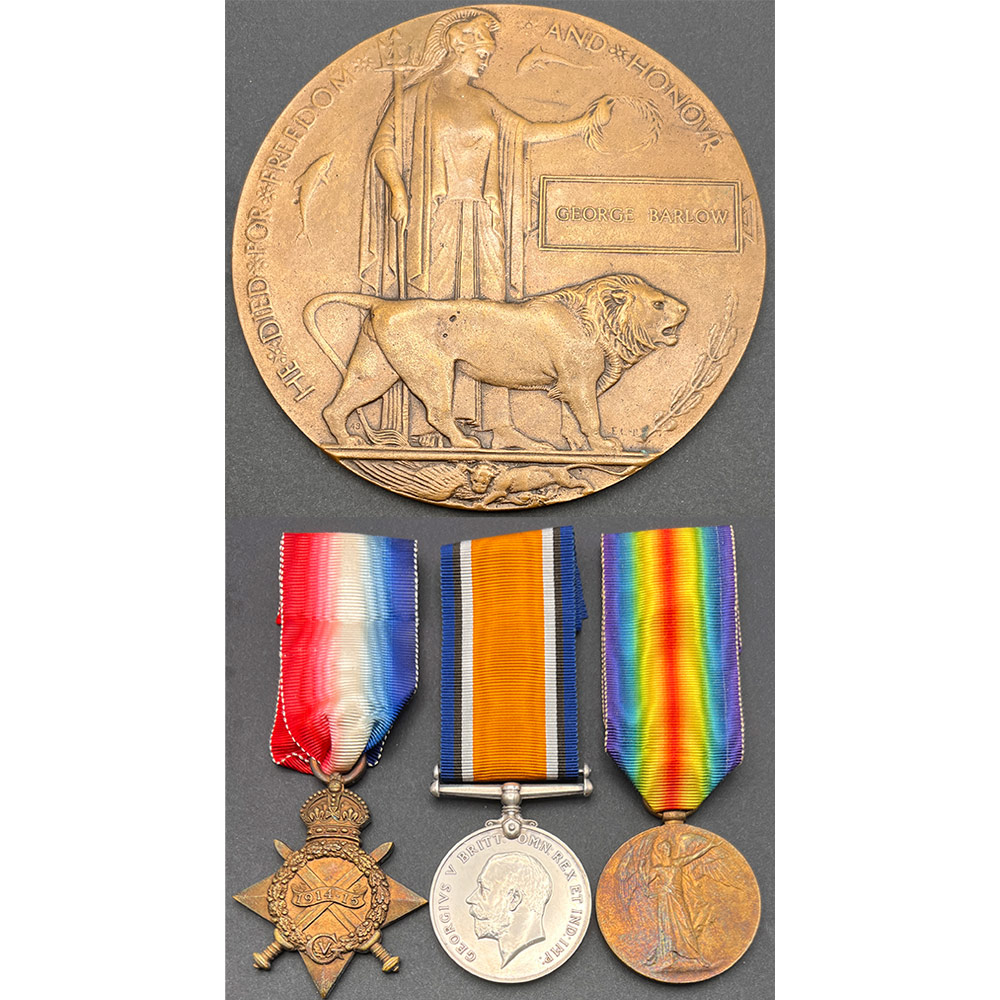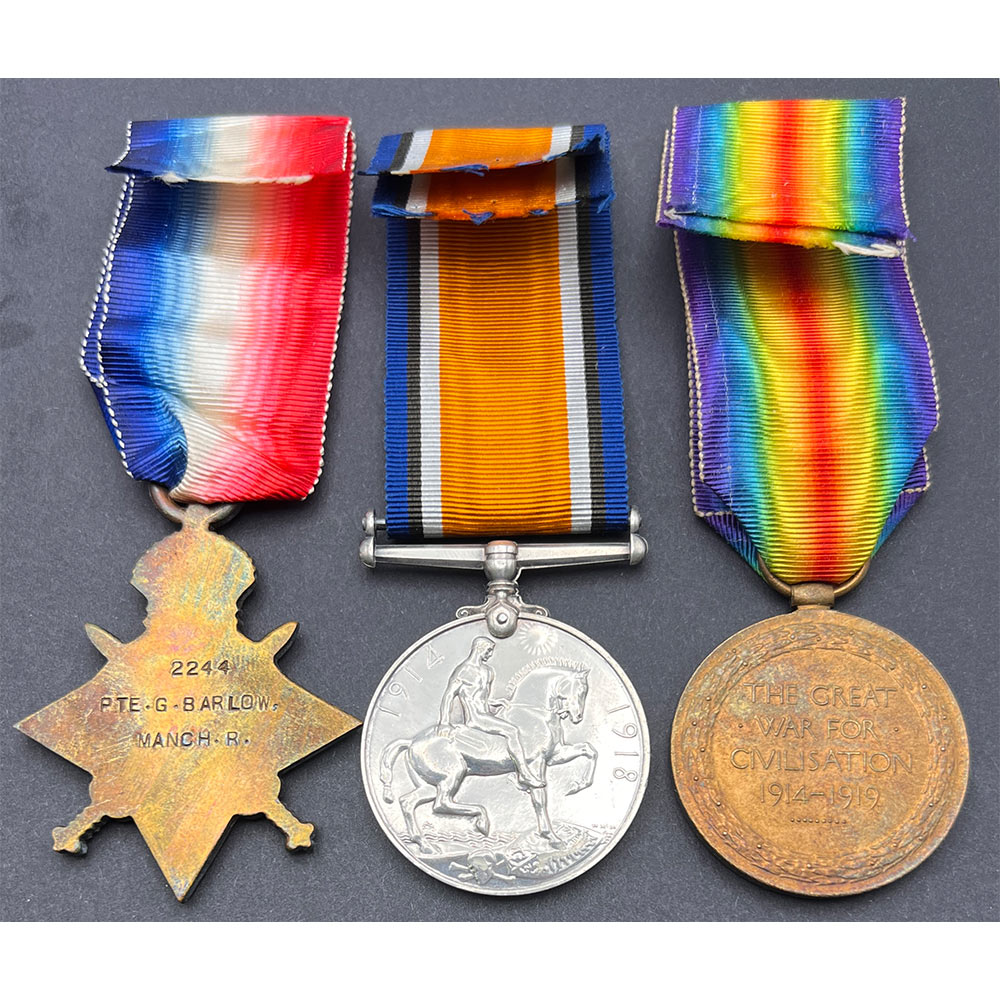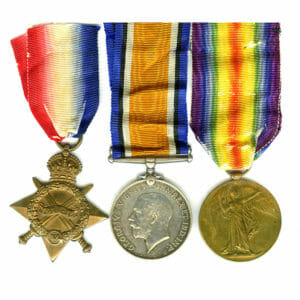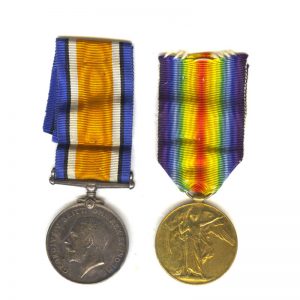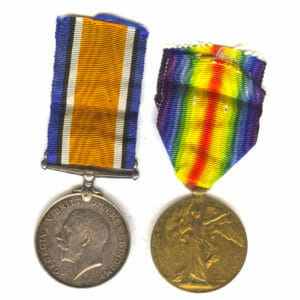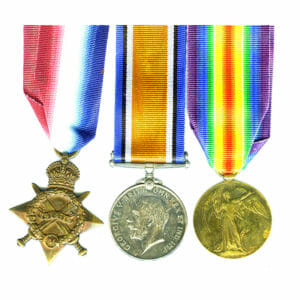Description
WrWW1 Trio and Plaque, Private George Barlow, 1st Bn Manchester Regiment, Killed in Action 8th March 1916, Battle of Dujaila, Iraq.
1914-15 Star officially impressed: “2244 Pte. G. Barlow, Manch. R.”
BWM and Victory pair officially impressed: “2244 Pte. G. Barlow. Manch. R.”
Memorial Plaque officially named: “GEORGE BARLOW”
Trio mounted on old matching ribbons.
Private George Barlow, a Lancashire local from Oldham, North Manchester, served in Iraq with the 1st Battalion of the Manchester Regiment during World War 1.
On the 8th March 1916, the Battle of Dujailia or in Turkish Sabis Muharebesi, was fought between the British and Ottoman Forces.
Pte Barlow was part of the Anglo-Indian Relief Force, on their way to end the Siege of Kut, led by Lt-Gen Fenton Aylmer.
In short, the attempt was a failure, and Aylmer lost 3,500 men, amongst them was Mr Barlow.
He was only 19 years old.
Please click here to read more about the Battle of Dujaila, 8th March 1916.
The following extract recalls the Manchesters:
“Despite the missed opportunities, the fresh reinforcements, and the strong defensive entrenchments, by late afternoon, the British once again were on the verge of a breakthrough.
59th Scinde Rifles (Frontier Force) and 1st Manchester Regiment of the 8th (Jullundur) Brigade succeeded in capturing the first two lines of trenches of the Dujalia Redoubt. However, with no reserves left to exploit the success, the two battalions could do nothing more than hang on to their gains. Slowly but surely, the Ottoman battalions counter-attacked with bayonets and grenades, which were in short supply on the British side, forcing the Manchester’s and Rifles to retreat in the early evening.
Of the 2,301 men of the 8th Brigade present, 1,174 were casualties by the end of the day.
In all, the Tigris Corps suffered almost 4,000 casualties. Through the night, the British forces fell back to a rendezvous position approximately 8,000 yards from the Dujalia position. When no counter-attack materialized from the Dujalia, Aylmer ordered his troops back across the river, ending the battle.
During the intense fighting, Private George Stringer, of the same unit, the 1st Manchesters would earn the Victoria Cross:
“For most conspicuous bravery and determination. After the capture of an enemy position, he was posted on the extreme right of the Battalion in order to guard against any hostile attack.
His battalion was subsequently forced back by an enemy counter-attack, but Private Stringer held his ground single-handed and kept back the enemy till all his hand-grenades were expended. His very gallant stand saved the flank of his battalion and rendered a steady withdrawal possible.”
MR GEORGE BARLOW
George was born circa 1897 in Oldham, Lancashire in North Manchester.
He was the son of Wright and Bertha Barlow, both from Ashton Under Lyne.
His father was a Cotton Spinner and aged 14 a young George was similarly employed in the Lancashire Cotton Mills as Cotton Mule Piercer.
Meanwhile his old brother had joined up with the 1st King’s Dragoon Guards, and would go to France in August 1914 as one of the “Old Contemptibles.”
Like his brother already at the war front in France, George signed up with the 1st Bn Manchester Regiment during the early part of the war, and first disembarked for active service on 9th May 1915.
Initially landing into France he would see plenty of action for the remainder of the year.
In December 1915, the Battalion was moved all the way to “Mesopotamia” aka Iraq for the next 2 years.
Further heartbreak would be received at home by his Mother Bertha, when a little over a year later, his Older Brother 6477 Private Harry Barlow, of the 1st King’s Dragoon Guards, died of wounds in France on 11th June 1917.
